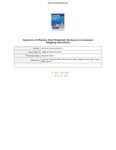Selection of Effective Risk Mitigation Strategies in Container Shipping Operations
| dc.contributor.author | Chang, C-H | en |
| dc.contributor.author | Xu, J | en |
| dc.contributor.author | Dong, J-X | en |
| dc.contributor.author | Yang, Z | en |
| dc.date.accessioned | 2019-09-28T12:29:07Z | |
| dc.identifier.uri | http://hdl.handle.net/10026.1/14944 | |
| dc.description.abstract |
Purpose Container shipping companies face various risks with different consequences that are required to be mitigated. Limited empirical research has been done on identifying and evaluating risk management strategies in shipping operations with different risk consequences. This paper aims to identify the appropriate risk mitigation strategies and evaluate the relative importance of these strategies. Design/methodology/approach Literature review and interviews were used to identify and validate the appropriate risk mitigation strategies in container shipping operations. A questionnaire with a Likert five-point scale was then conducted to rank the identified risk mitigation strategies in terms of their overall effectiveness. Top six important strategies were selected to evaluate their relative importance under three risk consequences (i.e. financial, reputation and safety and security incident related loss) through using another questionnaire with paired-comparison. Fuzzy analytic hierarchy process (AHP) was then conducted to analyse the paired-comparison questionnaire. Findings After conducting a systematic literature review and interviews, 18 mitigation strategies were identified. The results from the first questionnaire show that among the 18 strategies, the top three are “form alliances with other shipping companies”, “use more advanced infrastructures (hardware and software)” and “choose partners very carefully”. After conducting fuzzy AHP, the results show that shipping companies emphasize more on reducing the risk consequence of financial loss; and “form alliance with other shipping companies” is the most important risk mitigation strategy. Originality/value This paper evaluates the risk mitigation strategies against three risk consequences. Managers can benefit from the systematic identification of mitigation strategies, which shipping companies can consider for adoption to reduce the operational risk impact. | |
| dc.language.iso | en | en |
| dc.title | Selection of Effective Risk Mitigation Strategies in Container Shipping Operations | en |
| dc.type | Journal Article | |
| plymouth.journal | Maritime Business Review | en |
| dc.identifier.doi | 10.1108/MABR-04-2019-0013 | en |
| plymouth.organisational-group | /Plymouth | |
| plymouth.organisational-group | /Plymouth/PRIMaRE Publications | |
| plymouth.organisational-group | /Plymouth/REF 2021 Researchers by UoA | |
| plymouth.organisational-group | /Plymouth/REF 2021 Researchers by UoA/UoA17 Business and Management Studies | |
| plymouth.organisational-group | /Plymouth/Research Groups | |
| plymouth.organisational-group | /Plymouth/Research Groups/Marine Institute | |
| dcterms.dateAccepted | 2019-09-28 | en |
| dc.rights.embargodate | 2019-12-11 | en |
| dc.rights.embargoperiod | Not known | en |
| rioxxterms.versionofrecord | 10.1108/MABR-04-2019-0013 | en |
| rioxxterms.licenseref.uri | http://www.rioxx.net/licenses/all-rights-reserved | en |
| rioxxterms.type | Journal Article/Review | en |


